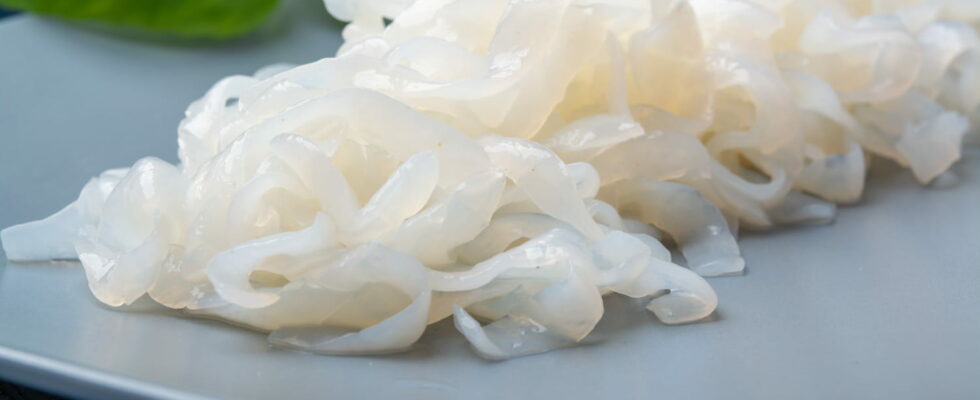Konjac would help to lose weight, reduce cholesterol… but it is essentially made up of fibers and can therefore have undesirable effects that it is better to be aware of. Insights and advice from Dr Alexandra Dalu, nutritionist.
Came from AsiaTHE konjac has become over the 2000s an essential food for those looking to losing weight. He is also famous for making lower cholesterol and reduce the blood sugar but be careful not to neglect its rich in fiber…
What is konjac?
Konjac is a perennial plant, which grows from a very large spherical tuberous rhizome. Native to the tropical and subtropical forests of Southeast Asiait grows naturally in Vietnam, China, IndonesiaKorea or even Japan. Huge sound tuber (up to 80 cm in circumference) is reduced to a fine white powder, a basic ingredient in Asian cuisine, then transformed into blocks or vermicelli.
What are the health benefits of konjac?
Konjac contains a fiber, the glucomannan. It’s an ingredient zero calories and gluten free. “He created a feeling of mechanical satiety, like a big inflating balloon“explains Dr. Alexandra Dalu, nutritionist. He can help with weight loss “but it’s not a quick fix“. Konjac can also accompany periods of fasting. “UA plate of konjac spaghetti in the evening will keep you going until noon the next day. Konjac can compensate for the day after a party or be taken as a detox cure“. Konjac is also a prebiotic, “it feeds the probiotic, the good microbe in our second brain, the gut” reminds the doctor. Finally, konjac can be a natural alternative to the enema. “Fiber is a natural process of colon cleansing” recalls Dr. Dalu.
Why does konjac make you lose weight?
The konjac contains a fiber, the glucomannan at the origin of its satiating power. “It is a plant that swells on contact with water, so when you consume it the stomach fills up and creates a feeling of mechanical satietylike a big inflating balloonexplains Dr. Dalu.This will send a message of satiety to the volume receptors of the stomach which is full, which themselves will send a message to the brain saying I am no longer/not hungry“Konjac is used to reduce the amounts one eats.”It is recommended to take your konjac sachet half an hour before the main meal“, specifies the doctor. “It’s a little boost but it’s not the cure for weight gain” she recalls.
Does Konjac Lower Cholesterol?
“Like all fibers, konjac slows the absorption of fat and sugar in the blood“recalls Dr. Dalu.”If the patient suffers from blood sugar problems or high cholesterol, konjac can help with a rich meal. Fiber will limit fat and sugar intake.” “However, konjac is not a treatment for cholesterol”. “It is essential avoid taking it at the same time as your treatment for cholesterol, so as not to cancel the effects of the drugs” warns the expert.
Does konjac help fight diabetes?
Konjac mechanically reduces fat absorption. “It’s a natural alternative to counteract a spike in blood sugar but it is not not a cure for diabetes” recalls Dr. Dalu. “Be careful if a diabetic consumes konjac at the same time as taking his treatment, it will be poorly absorbed by the body.“ warns the expert.
Be careful if a diabetic consumes konjac at the same time as taking his treatment, it will be poorly absorbed by the body.
Constipation: is konjac a laxative?
Konjac has transit benefits. “If you have some constipation problems, konjac is ideal. It is interesting to carry out a small cure of konjac sachets, rather in the evening“reveals our expert. “It’s more effective than psyllium or chia” she adds. Konjac can promote transit for people who lack fiber. “For a person who consumes very few fruits and vegetables, eating konjac three times a week and drinking plenty of water can help transit even if it is not a panacea.“advises Dr. Dalu.
What are the dangers of konjac?
Since konjac is essentially made up of fibres, it should not be consumed at the same time as medication or vitamins. “It should be consumed 3 or 4 hours apart from meals“says Dr. Dalu. “If you eat it when you take your treatment, it will end up in the toilet because it will be taken by the fibers” adds our expert. “Konjac is also contraindicated for people who have stomach problems, a very long intestine and who have had a bowel obstruction“.”THE konjac contains no antioxidants or vitamins, it is empty calorie. It is therefore necessary to vary your diet and not to feed mainly on this food“ warns the doctor.
How to use it ?
Konjac can be used in dough (noodle, vermicelli, spaghetti..), in ricein sachets (powder) or capsule. “It’s necessary beware of food preparations and look carefully at the labels in order to check if salt is added. Naturally, konjac is bland in taste and translucent. A processed preparation loses the benefits of the plant” warns Dr. Dalu.
Thanks to Dr. Alexanda Dalu, nutritionist doctor. Author of the book “The 100 received ideas that prevent you from going well“, editions Leduc.s.
